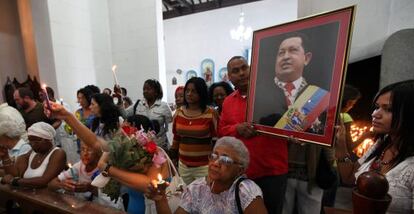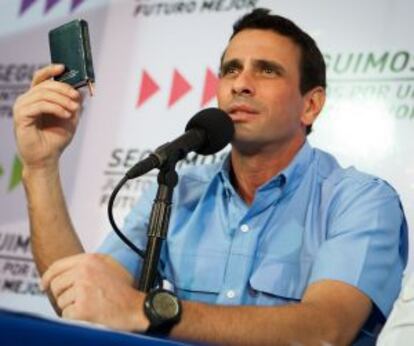Venezuela's top court rules Chávez can miss his inauguration ceremony
Opposition wants new elections called as constitutional showdown looms

The Venezuelan Supreme Court ruled on Wednesday that ailing President Hugo Chávez - who will miss his inauguration today - doesn't need to be formally sworn in because he is continuing on to a fourth subsequent term.
The announcement by Chief Justice Luisa Morales at a press conference comes as tensions between the government and the opposition intensify over conflicting clauses in the country's Constitution.
The Democratic Unity Committee (MUD) vowed on Wednesday to take its protest to the Organization of American States (OAS) and Mercosur to ensure that the Chávez-backed National Assembly respects a clause that provides that its speaker, Diosdado Cabello, assume the presidency until new elections can be called in 30 days.
Instead, Cabello asked lawmakers on Tuesday to invoke Article 231, which states that if for "any supervening reason" the president-elect cannot be sworn in before the assembly it can be done at a later date before the Supreme Court.

Chief Justice Morales said that no new swearing-in was necessary because Chávez remained Venezuela's president, with Nicolás Maduro also continuing in his role as vice-president.
After suffering from hemorrhaging and respiratory failure following his fourth cancer operation early last month in Havana, Chávez's actual condition remains a mystery. Venezuelans had no clue whether a ceremony would be held until Tuesday, when opposition leader Henrique Capriles demanded that the government be forthcoming on whether or not he would be able to attend his inauguration.
Capriles, the governor of Miranda state, who had been silent on the issue until Tuesday, warned that the country was headed for a constitutional showdown if the pro-Chávez Supreme Court didn't rule in favor of Article 233, which states that when a president-elect becomes "permanently unavailable to serve prior to his inauguration," the National Assembly speaker must take over and call elections in 30 days.
You have a responsibility to the people and to keeping the peace"
"You have a responsibility to the people and to keeping the peace," Capriles told the justices on Tuesday.
MUD executive secretary Ramón Guillermo Aveledo said the opposition would "defend the Constitution in a civil and peaceful matter" before international forums.
At the same time reports have surfaced of a growing rivalry between Cabello, who has the backing of the military, and Vice President Maduro, Chávez's handpicked successor. Both have publicly denied they are at odds.
Chávez supporters, meanwhile, announced that they will still hold a massive rally on Thursday in commemoration of the inauguration to show their support for him to serve the fourth term he was elected to last October. Even though there won't be an official swearing-in, Uruguayan President José Mujica, Bolivian President Evo Morales and Haitian President Michel Martelly have confirmed their presence. Argentinean President Cristina Fernández said she will travel to Cuba on Friday to visit the ailing Chávez.
In Washington, a US State Department official said that she hoped that discussions between the opposition and ruling United Socialist Party of Venezuela (PSUV) result in a "peaceful" solution. "It needs to be a broad-based discussion and it needs to be decided in a manner that is free, fair and transparent," said spokeswoman Victoria Nuland on Tuesday.
Jennifer Gómez, a Caracas travel agent, said elections must be called soon. "How much time are you going to wait? It could be a month, two months or three months. Elections can't wait," she told EFE news agency.
Tu suscripción se está usando en otro dispositivo
¿Quieres añadir otro usuario a tu suscripción?
Si continúas leyendo en este dispositivo, no se podrá leer en el otro.
FlechaTu suscripción se está usando en otro dispositivo y solo puedes acceder a EL PAÍS desde un dispositivo a la vez.
Si quieres compartir tu cuenta, cambia tu suscripción a la modalidad Premium, así podrás añadir otro usuario. Cada uno accederá con su propia cuenta de email, lo que os permitirá personalizar vuestra experiencia en EL PAÍS.
¿Tienes una suscripción de empresa? Accede aquí para contratar más cuentas.
En el caso de no saber quién está usando tu cuenta, te recomendamos cambiar tu contraseña aquí.
Si decides continuar compartiendo tu cuenta, este mensaje se mostrará en tu dispositivo y en el de la otra persona que está usando tu cuenta de forma indefinida, afectando a tu experiencia de lectura. Puedes consultar aquí los términos y condiciones de la suscripción digital.








































